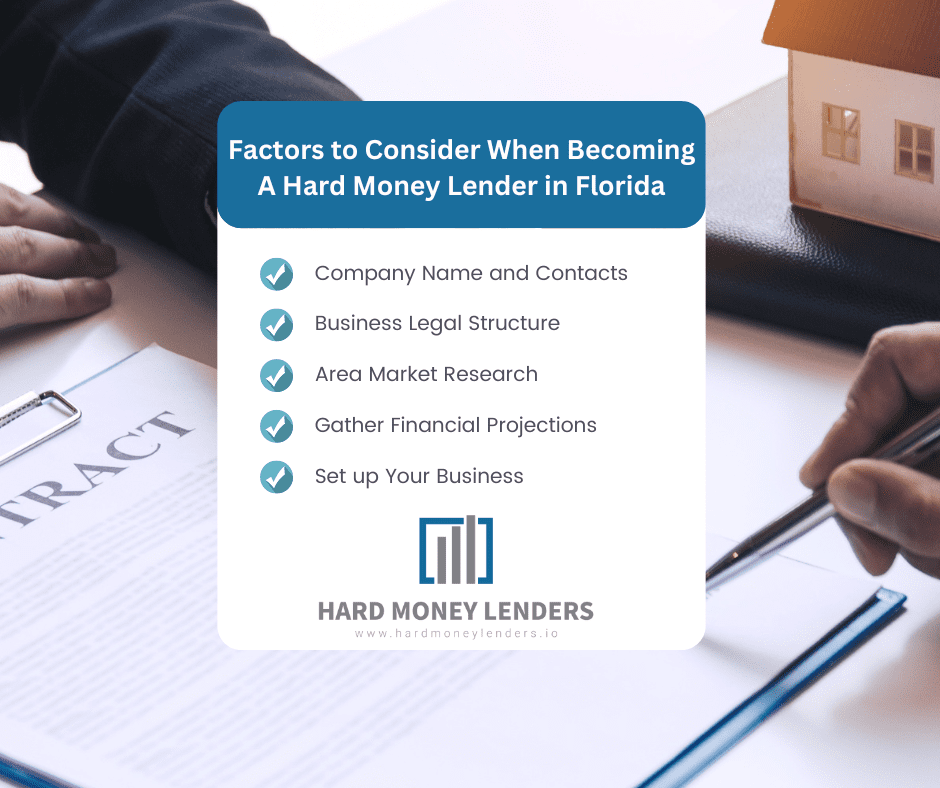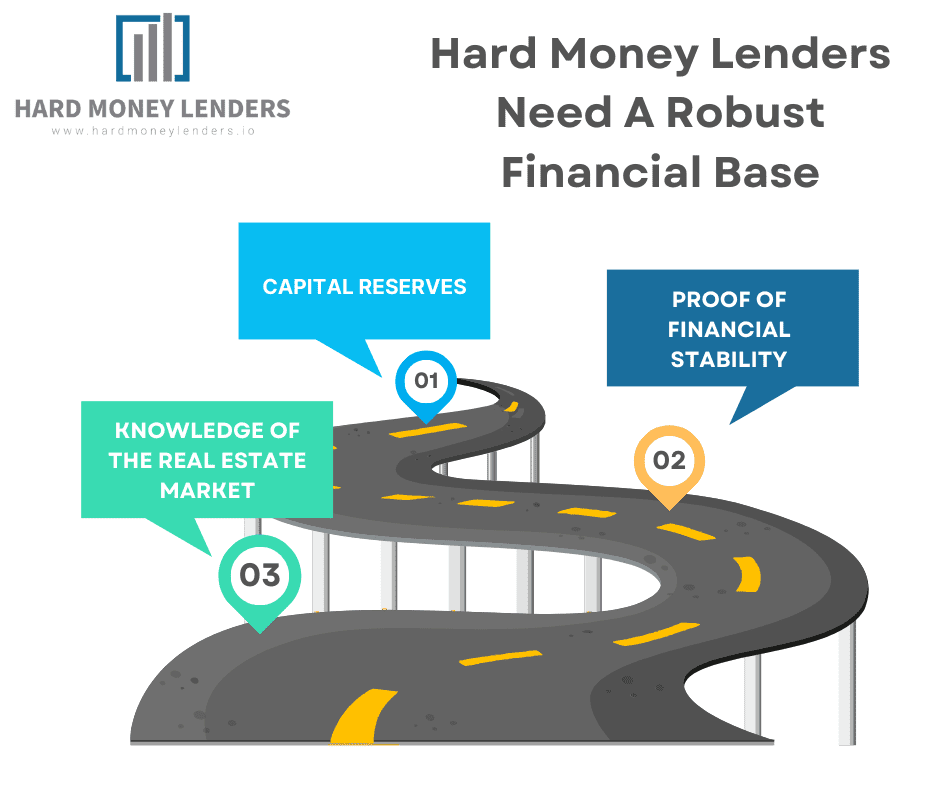Last Updated on March 20, 2024
Hard money lending is alternative to formal lending sources and warrants those who borrow to use their investment (mostly property) as collateral on the loan. While several lending sources rely on a borrower’s credit history, hard money lenders rely on the specific asset involved. If you’re looking to become a real estate financier in Florida, it’s important to understand the requirements for becoming a hard money lender in Florida. Hard money lending as an investment opportunity in Florida is a special chance for business people with enough capital to invest. However, if you are making any financial decision it is vital to consider due diligence and predetermine any possible risks.
Understanding Hard Money Lending
Hard money lending is an essential facet of the real estate investment landscape, providing an alternative to traditional bank financing. Hard money loans, typically short-term in nature, are secured by the property itself rather than the borrower’s creditworthiness.
This form of lending is particularly attractive for real estate investors looking to renovate or develop properties for resale or rental. Unlike conventional loans, hard money loans offer swift approval processes and flexible repayment terms, catering to investors who need immediate funding to capitalize on time-sensitive opportunities.
The essence of hard money lending lies in its asset-based approach, with loan amounts primarily based on the After Repair Value (ARV) of the property.
This strategy allows lenders to focus on the potential profitability of the investment rather than the borrower’s financial history. Consequently, hard money loans are often associated with higher interest rates and fees, reflecting the increased risk taken by the lender and the convenience of fast, accessible funding for the borrower.
Factors to Consider When Becoming A Hard Money Lender in Florida
If you wish to become a hard money lender in Florida, you should put the following factors into consideration.
Company Name and Contacts
You should start by naming your business and acquiring a corporate address, fax, and phone number. These are important regardless of how you lawfully structure your business because your legal papers will require a corporate address. Plus, if people want to find a hard money lender in South Florida, they need a valid business name and contact information. To reserve your company name, contact the secretary of state’s office in North Florida.
Business Legal Structure
You need a professional lawyer to determine the legal structure of your hard money lending business in Florida. Your attorney should be an expert in investments and real estate. He should also have experience serving hard money lenders in Florida residential. Discuss with your lawyer the proper business type, tax issues, licensing and various legal matters concerning residential and commercial lending.
Area Market Research
You must focus on your particular investment area. Talk to hard money lenders in Florida residential for both positive and negative feedback. You also focus on what you understand and discover what the markets are doing in your space. For instance, find possible hard money lenders interest rates in Florida and use the information to predict the possible input and output required for the business. Consequently, you would want to know the main challenges faced by hard money lenders in Florida.
Business Plan
Draft your business plan and underwriting standards based on the types of lending you plan to do. This means you develop items to value parameters, investment amounts, interest rates charged, property types, etc. Your business plan should be designed to guide and keep you on track.
Gather Financial Projections
Whether you are investing your own money or a loan, you need to know the break-even points, projected monthly and annual income as per interest rates charged, monthly expenditures, legal fees, and other expenses. You will require to formulate a balance sheet, income and cash flow statements, plus a profit and loss statement. Note that hard money lenders interest rates will depend on the type of loans you offer, and the initial capital you want to invest.
Set up Your Business
Purchase a domain name, set up your website and launch your business. You should have the website done by an expert. Your possible clients must be in a position to access the website when search online to find hard money lenders in South Florida. Include an intake form on the site to automatically search for projects online. You must also set up your physical office in an accessible location, it becomes easy to discover that you are one of the hard money lenders in Florida.
Legal Framework for Hard Money Lenders in Florida
When it comes to becoming a lender in Florida, it’s important to understand the legal requirements on becoming a hard money lender in Florida. As always, it’s important to consult with a legal professional and keep in mind that what you see below is not legal advice.
Licensing Requirements
Prospective hard money lenders must navigate a comprehensive application process to obtain the necessary licenses, which includes submitting to background checks that scrutinize criminal history and financial probity, undergoing financial assessments to verify the adequacy of capital and the soundness of financial practices, and completing pre-licensing education courses designed to equip applicants with a thorough understanding of the legal and ethical requirements of lending in Florida.
Usury Laws
A critical aspect of operating as a hard money lender in Florida is adherence to the state’s usury laws. These laws are enacted to prevent exploitative lending practices by setting maximum allowable interest rates. The interest rates that can be charged on loans are tiered, with specific caps depending on whether the loan amount is under or over $500,000.
By imposing these limits, Florida aims to protect borrowers from excessively high rates that could lead to financial distress or unfair exploitation. Hard money lenders must carefully structure their loan agreements to comply with these regulations, ensuring their interest rates and loan terms do not exceed the legal thresholds.
Compliance with State Regulations
In addition to licensing requirements and usury laws, hard money lenders in Florida must ensure their lending practices align with broader state regulations, including the Florida Fair Lending Act.
This act is designed to promote fairness and transparency in the lending process, prohibiting discriminatory practices and requiring lenders to provide borrowers with clear, understandable information about loan terms and conditions.
Compliance with these regulations is not only a legal obligation but also a critical component of building trust and credibility in the lending community. Lenders who adhere to these principles can foster positive relationships with borrowers and other stakeholders, contributing to a healthy and vibrant real estate market.
Navigating the legal landscape of hard money lending in Florida requires diligence, integrity, and a commitment to fair practices. Make sure to consult with an attorney on legal matters to ensure compliance
Financial “Requirements” for Becoming a Hard Money Lender in Florida
To launch a successful hard money lending operation in Florida, establishing a robust financial base is paramount. Here’s a deeper dive into what this entails:
- Capital Reserves: Adequate capital reserves are critical, not just for issuing loans but also for ensuring operational liquidity in times of need. This means having enough liquid assets to cover loan disbursements, interest payments to investors (if using investor money), and any unexpected downturns in the market. The exact amount needed can vary widely depending on the scale of your lending operations but having a substantial financial cushion is advisable to weather any potential financial storms.
- Proof of Financial Stability: Demonstrating financial stability to both potential borrowers and regulatory bodies is essential. This could involve presenting detailed financial statements, undergoing credit checks, and maintaining a clean financial record. Florida’s licensing process may also require posting a surety bond, serving as a financial guarantee of your compliance with state lending laws. The bond amount varies, reflecting the lender’s financial strength and perceived risk.
- Knowledge of the Real Estate Market: A nuanced understanding of Florida’s diverse real estate market is crucial for making sound lending decisions. This includes familiarity with local market values, real estate trends, and regional economic indicators. Such knowledge aids in accurately assessing loan requests, determining appropriate loan-to-value ratios, and identifying promising lending opportunities that align with market dynamics.
Educational and Experience Requirements
While there’s no strict educational path to becoming a hard money lender, certain backgrounds can enhance your effectiveness and credibility:
- Finance or Real Estate Education: A formal education in finance, real estate, or a related field can provide a foundational understanding of lending principles, risk assessment, and market analysis. Courses in real estate law, finance, and investment strategies are particularly beneficial.
- Practical Experience: Hands-on experience in real estate investment, banking, or finance is invaluable. This experience can come from various sources, including working in a financial institution, real estate brokerage, or investment firm. Successful hard money lenders often leverage their past experiences to assess risks, understand borrower needs, and navigate complex transactions.
Establishing Your Business
Setting up and growing your hard money lending business involves several strategic steps:
- Forming a Legal Entity: Establishing a legal business entity, such as a Limited Liability Company (LLC) or corporation, is crucial for protecting personal assets and enhancing your professional image. This structure can provide legal and financial separation between your business activities and personal affairs, limiting personal liability in the event of legal disputes or business debts.
- Building a Network: Cultivating a strong professional network is instrumental in finding quality lending opportunities and staying abreast of industry trends. This network can include real estate investors, brokers, attorneys specializing in real estate law, accountants, and other hard money lenders. Regular attendance at real estate investment meetings, seminars, and local business events can facilitate valuable connections.
- Marketing Your Services: A targeted marketing strategy can significantly boost your visibility and attract potential borrowers. This might entail developing a professional website that outlines your lending criteria, services, and success stories. Active engagement on social media platforms, participation in real estate forums, and content marketing through blogs or articles can also enhance your online presence. Additionally, consider traditional marketing avenues like networking events, real estate seminars, and direct mail campaigns to reach a broader audience.
Final Thoughts on the Requirements for Becoming a Hard Money Lender in Florida
Hard money lenders in Florida normally charge higher interest fees than traditional loans. However, they can provide borrowers with increased access to loans, and a tolerant approval process. Investors with less money at hand and high equity in the property are likely to opt for hard money lenders for loans.
Additionally, property investors at risk of foreclosure may also take up hard money loans.
Hard money lending interest rates in Florida range from eight percent to 18 percent. The interest rate relies on the loan amount, the property’s ARV and the borrower’s credit rating. A person with bad credit is charged a higher interest rate than somebody with an excellent credit rating.
FAQs About Hard Money Lender Requirements in Florida
How Can I Mitigate Risks Associated with Hard Money Lending?
To mitigate risks, conduct thorough due diligence on borrowers and properties, including credit checks, property appraisals, and title searches. Additionally, structuring loans with clear terms and realistic repayment schedules, and maintaining adequate capital reserves can help manage the risks inherent in hard money lending.
What Types of Properties Can I Finance as a Hard Money Lender in Florida?
Hard money lenders in Florida can finance a wide range of property types, including residential, commercial, and land. However, the focus is often on investment properties rather than owner-occupied residential homes, due to regulatory restrictions and the short-term, high-interest nature of hard money loans.
What should I do if a borrower defaults on a hard money loan?
In the event of a default, it’s important to have a clear action plan outlined in the loan agreement. This may involve initiating foreclosure proceedings to recover the invested capital. Working with a legal professional can help ensure that the process is handled efficiently and in compliance with state laws, minimizing losses and protecting your investment.
How do I build a reputable hard money lending business in Florida?
Building a reputable business involves offering fair, transparent loan terms, providing excellent customer service, and successfully funding profitable deals. Establishing a strong online presence, collecting positive testimonials from borrowers, and networking within the real estate and financial communities can also enhance your reputation and attract more clients.
What is the process for evaluating a loan application in hard money lending?
Evaluating a loan application typically involves assessing the borrower’s creditworthiness, the value and condition of the property, and the feasibility of the investment plan. This process includes credit checks, property appraisals, and a review of the borrower’s investment experience and financial stability. The goal is to gauge the likelihood of loan repayment and the potential for successful investment returns.
Can I partner with other investors to fund hard money loans?
Yes, partnering with other investors can be a viable way to increase your lending capacity and spread risk. This can be done through joint ventures, syndications, or by pooling resources in a private lending fund. Such partnerships require clear agreements on loan management, profit sharing, and risk mitigation strategies.
Hard Money Lenders IO is a Private Lending Company located in Miami, Florida providing loans to real estate investors and entrepreneurs. We specialize in offering loans to professional real estate investors for their non-owner occupied real estate investments. We operate throughout the state of Florida & have a network of investors nationwide.

Jack Roberts has spent the last 5 years in the Private Money Lending world helping real estate investors secure financing for their non-owner occupied real estate investments. When he’s not thinking about real estate, Adam is an avid Jazz music fan and fisherman.




